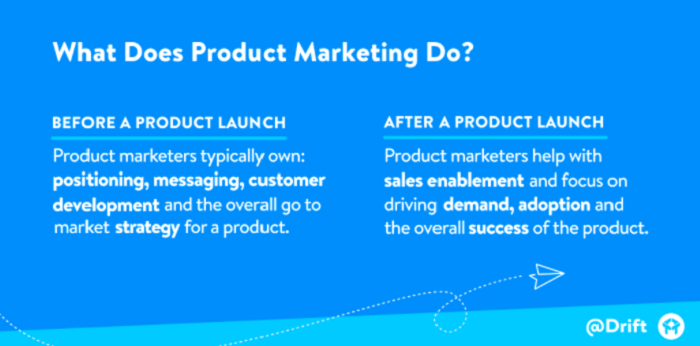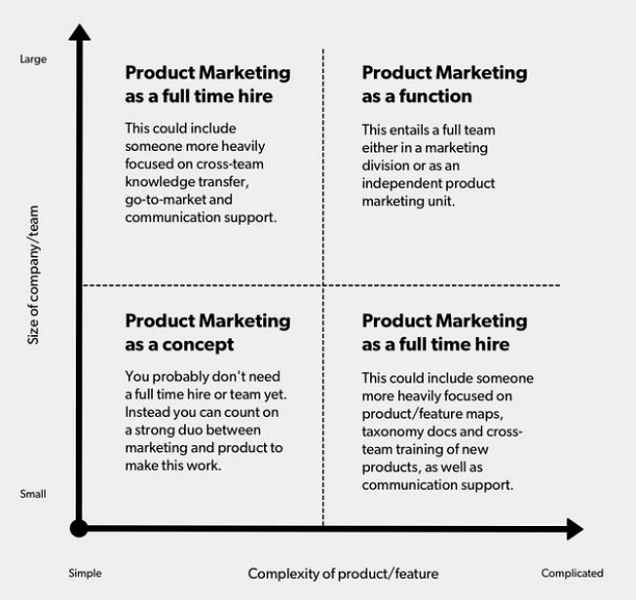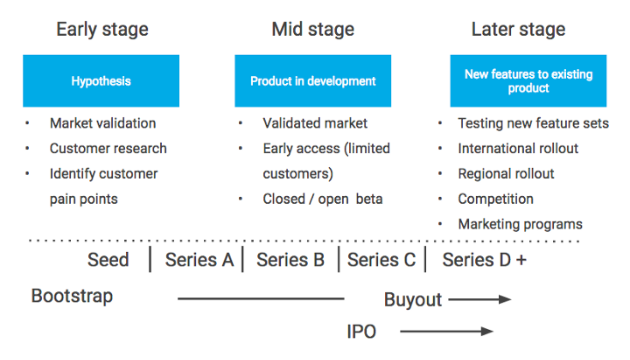Decoding the Product Marketing Manager’s role
Published on October 2, 2017 – 5-minute reading
Article in English
Source: here
A 2016 survey by Glassdoor listed Product Marketing Manager as the #13 top job in the US. Impressive, right?
If you can’t answer that, don’t worry – most start-ups, established companies, and even job applicants can’t answer those questions, either.
Sales teams close deals and bring in revenue. Product teams are focused on development. These roles are self-explanatory. But Product Marketing is more complicated and nuanced. Positioned at the intersection of Sales, Marketing, and Product Development, Product Marketing can seem to lack clarity but is expected to be in sync with all three of these areas, building worthwhile product-related strategies.
Product Marketing is a unique role that calls for a clear definition and action plan to prevent tasks and responsibilities from falling through the cracks due to overlap with other areas.
With so much ambiguity surrounding this role, it’s time that we address what Product Marketing is, what to expect of a Product Marketing Manager in your company, when to hire one, and how to dissect their core responsibilities.
What is product marketing, anyway?
Product Marketing has been difficult to define from the very start. Here’s how Wikipedia used to define it: « Product marketing deals with the first of the 4P‘s of marketing, which are Product, Pricing, Place, and Promotion ».
Product marketing, as opposed to product management, deals with more Outbound Marketing tasks. For example, product management deals with the nuts and bolts of product development within a firm, whereas product marketing deals with marketing the product to prospects, customers, and others. Product marketing, as a job function within a firm, also differs from other marketing jobs such as marketing communications (Marcom), online marketing, advertising, marketing strategy, etc.
This definition was heavily criticized by Product Marketing veterans. April Dunford, Serial Entrepreneur and Consultant, wrote about it in a post from 2010:
This so-called « definition ». is not only laughably vague but the idea that a Tech Product Marketing Manager doesn’t have to worry about stuff like Place and Promotion was enough to get some belly laughs out of a room of senior Product Marketing Managers.
Product marketing is the process of promoting and selling a product to an audience. Product marketing, as opposed to product management, deals with more outbound marketing or customer-facing tasks (in the older sense of the phrase). For example, product management deals with the basics of product development within a firm, whereas product marketing deals with marketing the product to prospects, customers, and others.
Product marketing, as a job function within a firm, also differs from other marketing jobs such as marketing communications (Marcom), online marketing, advertising, marketing strategy, and public relations, although Product Marketing Managers may use channels such as online for Outbound Marketing for their product.
However, the most apt definition is the one crafted by the folks at Drift, which clearly defines what Product Marketing Managers do before and after the product launches.
What is product marketing?
Dissecting a Product Marketing Manager’s deliverables
Even with all these definitions, it can still be tricky to know what to expect of a Product Marketing Manager, as their deliverables are as dynamic as their role.
Joanna Lord, CMO (Chief Marketing Officer) of ClassPass states:
Product marketing, at its heart, is about understanding what you’re building, why you invested in it, and how it will benefit the user – and then messaging that understanding to your customer.
Whereas marketing is traditionally about leveraging channels to drive prospects or leads – to get people at the top of the funnel and then move them through it – product marketing is more about helping existing customers understand your products and features and engage with them.
Clearly, the role of the Product Marketing Manager, at its core, is focused on having a deep
understanding of the customer and the market, building strategies that complement the entire lifecycle of the product, and communicating its value to the users.

Here’s the complete list of deliverables that companies should expect from their Product Marketing Manager.
#1. Initial product research and hypothesis building
The Product Marketing Manager’s role begins with initial product research and hypothesis building, which roughly translates into analyzing a customer’s expectation and the real need for the product in the market.
A Product Marketing Manager evaluates the feedback received by sales and customer support teams and digs deep into what customers really expect from a product and what kind of features they expect the brand to launch next. This is also the stage to make sense of trends and frequently mentioned conversations with prospects and users.
#2. Competitor research
It’s highly unlikely that your soon-to-be-launched product doesn’t have a competitor. That’s why competitor research plays a major role in product pre-launch. Just like initial product research, analyzing competitors helps in having a deep understanding of what users are seeking, and what features and deals are important for them to stay with the product. This information is critical for Product Marketing Managers to build the best « Go-To-Market » strategy.
#3. Defining product positioning and messaging
This is the most critical element for Product Marketing Managers. Having accumulated deep user insights and customer data, the next step is to define accurate positioning and messaging for taking the product to market. This is also a pivotal step as good messaging and positioning will define the longevity of the product. Product positioning and messaging should be well documented for the entire team.
#4. Building internal product training
A key task bestowed upon Product Marketing Managers is training the internal team, which serves two purposes:
- It helps the whole team see the final product, complete with messaging and positioning, and ensures that they are well-prepared for the actual launch;
- It encourages the team to come with questions and gives them deep insights about the final product and how it works.
#5. Building launch strategy
Once the team is ready with internal feedback and research, it is time for the Product Marketing Manager to step in and build a robust launch strategy. This includes coordinating with all the teams to develop launch-related documents, such a demo deck, sales documents, landing pages, content strategy, etc.
#6. Actual launch and promotion
Having launched the product, it is the Product Marketing Manager’s job to focus on the promotion, enabling sales, creating awareness, and getting more users to sign up and start using the product.
On the surface, many of these tasks may feel puny, however, they essentially define the final outcome of the product. It is therefore essential that the role of the Product Marketing Manager is well defined.
This brings us to the perennial discussion in tech circles:
When should we hire a Product Marketing Manager?
The answer depends on the size of your company and the complexity of your product. Here’s a matrix that defines it the best:

Yasmeen Turayhi, Global Product Marketing lead at AdRoll, proposes a framework that’s based on the « stage » of the product’s growth. She states that different stages of the product require different Product Marketing Managers.

She emphasizes …
Not all products are created equal, and you want to ensure you’re hiring a Product Marketing Manager who has been successful in the product stage that you’re currently in.
Product Marketing Managers help build products; understanding their key deliverables and when to hire them is an important aspect that high-growth companies should understand. By inundating their profiles with tasks that take them away from focusing on the product, companies are actually jeopardizing their growth.
Author of the article
Taru Bhargava
Content Marketing Manager, Lawpath, B2B SaaS | Australia
Related services – Executive Programs and Training
- Product Development and Management – How to develop the successful product: From dream to reality.
- MODULE 03 – Planning & Roadmap: How to communicate a high-level vision of your product and service offering.
- MODULE 04 – Market & Competition: How to identify trends, innovation potential, risks and opportunities.
- MODULE 06 – Development & Product Marketing: How to create new goods and services for success in a fast-changing world.
- MODULE 07 – Financing & Investment: How to ensure your investment addresses market opportunities and customer needs.
- MODULE 09 – Training & Support: How to align your employees and partners for successful launch.
Categories
Tags
Product Manager
Subscribe to our blog
Do you want to better understand the world around you and adapt to its constant changes?
Would you like experts to inform, explain and decipher the latest news and best practices in innovation, agile leadership, product and service development, digitalization, and its transformation?
Fields with an asterisk (*) are mandatory.

COVID-19
© 2016-2021 AlpRocket – All right reserved

